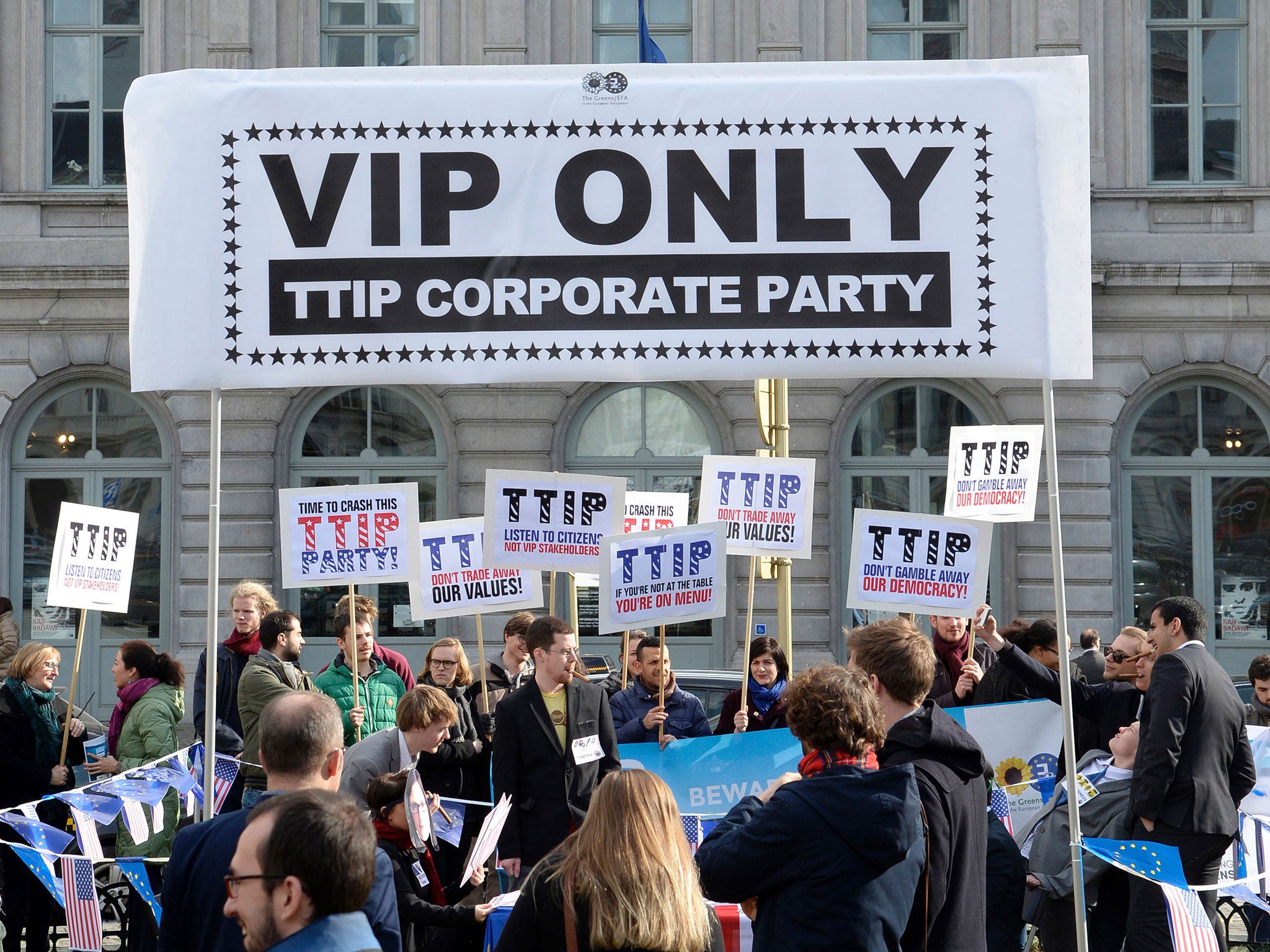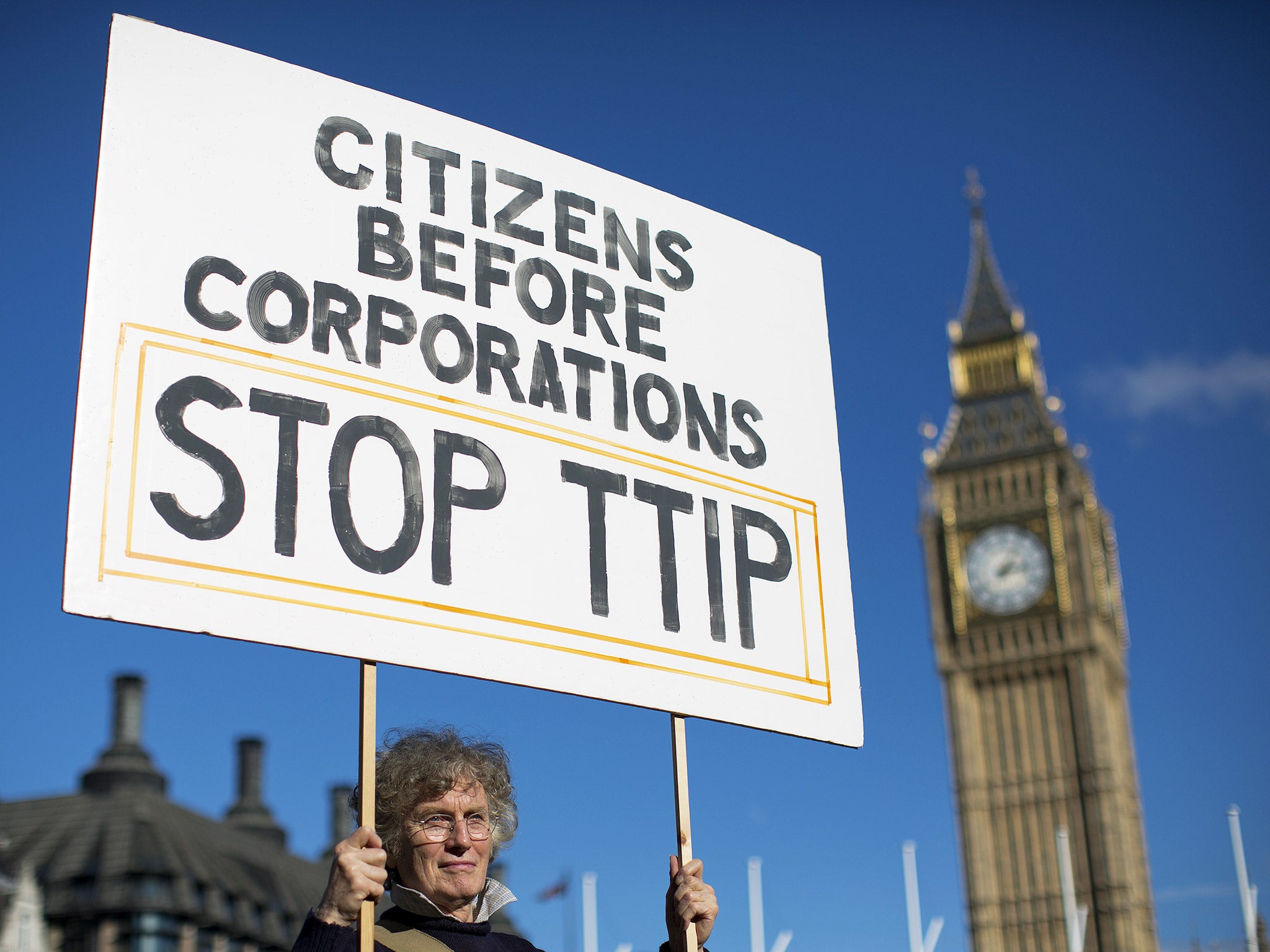TTIP: Government caves in to cross-party alliance of Eurosceptic MPs demanding NHS is protected from controversial deal
Facing an embarrassing defeat just weeks before the EU referendum, Downing Street said it would accept the amendment backed by Tory, Labour, SNP and Green MPs

Your support helps us to tell the story
From reproductive rights to climate change to Big Tech, The Independent is on the ground when the story is developing. Whether it's investigating the financials of Elon Musk's pro-Trump PAC or producing our latest documentary, 'The A Word', which shines a light on the American women fighting for reproductive rights, we know how important it is to parse out the facts from the messaging.
At such a critical moment in US history, we need reporters on the ground. Your donation allows us to keep sending journalists to speak to both sides of the story.
The Independent is trusted by Americans across the entire political spectrum. And unlike many other quality news outlets, we choose not to lock Americans out of our reporting and analysis with paywalls. We believe quality journalism should be available to everyone, paid for by those who can afford it.
Your support makes all the difference.The Government has caved in to an unholy alliance of Labour and Tory Eurosceptic MPs who united to demand guarantees from the ministers to protect the NHS from the controversial TTIP trade deal.
Jeremy Corbyn told his MPs to support an amendment to the Queen’s Speech that ‘regretted’ the Government did not intend to legislate to “protect the National Health Service from the Transatlantic Trade and Investment Partnership”.
More than two dozen Tory MPs, who are backing a vote to leave the EU, also pledged to support the amendment along with the SNP and Greens.
Facing an embarrassing defeat just weeks before the EU referendum, Downing Street said it would accept the amendment.
“As we’ve said all along there is no threat to the NHS from TTIP,” said a Government spokesman.
“So if the amendment is selected we will accept it.”
However, it is unclear whether by accepting the amendment the Government would be forced to legislate to ensure that the NHS is explicitly excluded from TTIP.
Not to do so would suggest that the Government itself “regretted” not including a TTIP Bill in the Queen’s Speech.
However, such embarrassment may be considered a price worth paying in Downing Street to spike anti-EU guns in the Conservative Party.
If they had opposed the amendment, and it had been successful, it would have been the first time a Government has been defeated on a Queen’s Speech vote in nearly 100 years
But the move by Tory Europsceptics to openly side with Mr Corbyn to try and defeat the Government will further inflame tensions in the party.

It will infuriate Downing Street who wanted to use the unveiling of the Queen’s Speech to set a fresh agenda for the party after the 23 June poll.
Vote Leave, however expressed delight at the climb down.
“The Government has today admitted that the EU is a threat to our NHS. The only way we can protect the NHS from TTIP is if we Vote Leave on 23 June,” said the Tory MP Steve Baker MP.
A Labour source said they had backed the move because it had long campaigned against TTIP, but admitted that a number of Tories backing the amendment had “mixed motives”.
“Some of them are doing it from an anti-EU perspective but others just want to give Cameron a slap,” they said.
“We were more than happy to provide an outlet for them to vent their spleen.”
But Mr Lilley, who tabled the ammendment, said he had long standing concerns about TTIP which he wanted the Government to address.
“I support free trade. But TTIP introduces special courts which are not necessary for free trade, will give American multinationals the right to sue our Government - but not vice versa - and could put our NHS at risk,” he said.
“I cannot understand why the Government has not tried to exclude the NHS.”
A Labour spokesman said that it was natural to support the amendment as it was in the party’s manifesto at the last election. They added that, conversely, it could also help the Remain cause, as TTIP was a key concern of Labour voters worried about staying in the EU.
Campaign groups and unions applauded the move and said the deal was well worth doing if it put pressure on the Government to demand that the NHS be excluded from any TTIP negotiations.
Nick Dearden the director of Global Justice Now said it showed just how toxic an issue TTIP become.
“In the space of a couple of years, TTIP has gone from an obscure acronym to a massively controversial issue that has been a key issue in the EU referendum debate,” he said.
“MPs are right to push the issue over the need to protect the NHS and other vital public services from the threat of TTIP. Polls have constantly shown just how important the NHS is to voters in the UK, but the Government has been steadfast in its refusal to explicitly and bindingly rule it out of the negotiations. This is despite the fact that public health services in other countries have been attacked under similar trade deals.”
The Unite union said other countries had exempted key areas from the deal, but pointed out that David Cameron has not done this for the NHS, despite legal advice that showed that TTIP posed a “real and serious risk to the NHS”.
“The amendment gives MPs a unique opportunity to neutralise the NHS as an EU referendum issue and to protect our health service from irreversible privatisation,” said Unite’s assistant general secretary, Gail Cartmail.
Meanwhile in the Commons, the Conservative MP William Wragg insisted his party must not be “blind” to the potential for a US-EU trade deal to privatise the NHS.
Speaking during the second day of the Queen's Speech debate, Mr Wragg said the “simplest and surest” way to protect the NHS from “forced privatisation” and other costs is for the UK to leave the EU.
“TTIP could in effect force a partial privatisation of the NHS and there could be nothing for the UK Government or, worse, the British people to do about it were we to stay as a member of the European Union,” he said.
“And we on these benches must not be blind to the issue and leave it to other parties to make the case.”
War on Want executive director, said: “On TTIP and the NHS, the Government is trying to bamboozle us. The dangers of TTIP go far beyond the health service - only by stopping this grizzly deal altogether will we escape the threats it poses to democracy, society and the environment.”
Join our commenting forum
Join thought-provoking conversations, follow other Independent readers and see their replies
Comments